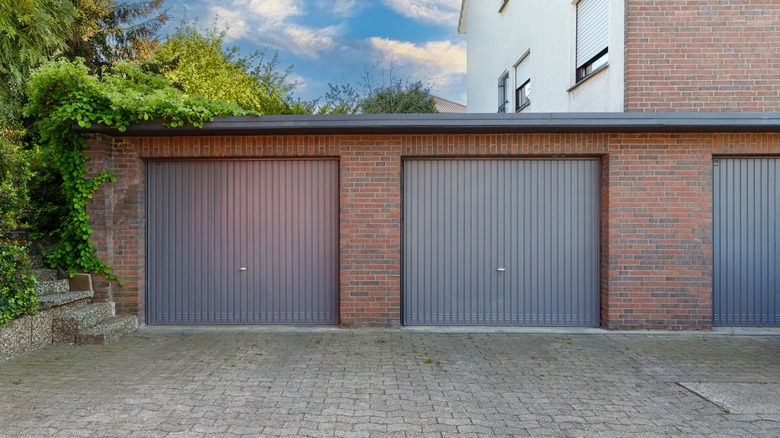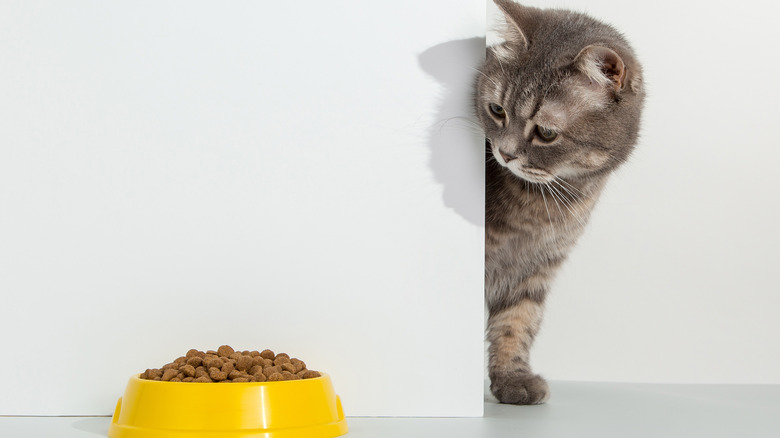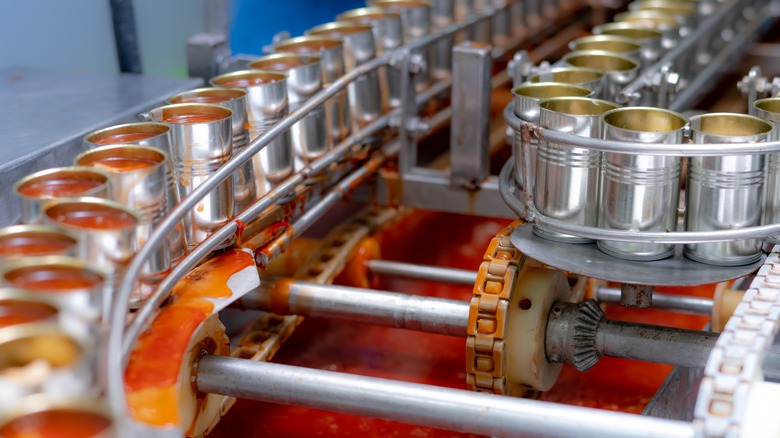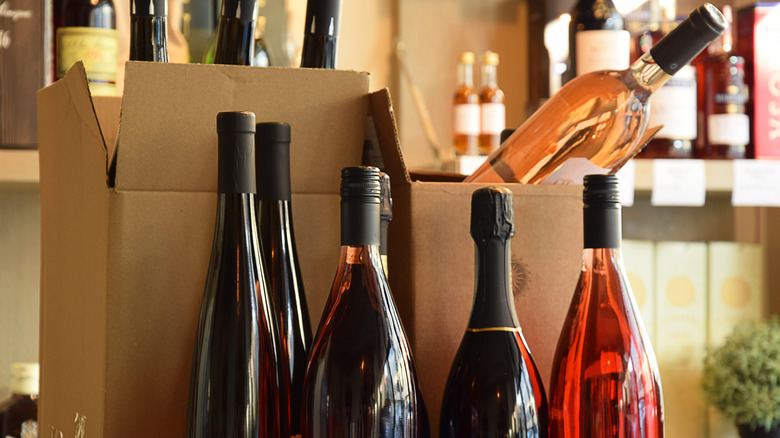5 Things You Should Never Store In Your Garage
The garage is likely a large and secure facility attached directly to your living space, making it an ideal location for significant amounts of storage requirements. Many homeowners include additional fridges, suitcase-specific shelves, tools, and other items in the garage. While a garage might be the ideal location to park your car every night, it's also a great space for use as a home workshop, band practice, and much more (via Cornwell Door Service).
Even though a garage provides a versatile workspace and storage location, there are a number of things that you should never keep there long-term. This is because garages don't provide the same kind of moisture and temperature protection that other areas of the home or dedicated storage facilities can offer. Simply put, certain belongings that make their way into the typical family home should not be stored, unprotected or otherwise, in the garage for any substantial length of time.
Keeping these five important home items in a better storage location will ensure that your lifestyle is never impeded by the potential problems that garage storage can impose. Similarly, when placing these items in a better storage location, you won't have to prematurely buy replacements, which can put a unique strain on your finances.
Pet food
Pet food might not be an obvious item on this list. Many homeowners use dry kibble to feed their beloved pets, and the hard, cereal-like nuts can seem highly durable and resistant to problems that may arise while stored in the garage. The truth is that pet food can easily spoil when exposed to the elements or stored improperly: The FDA notes that heat or moisture can degrade the efficacy and safety of dog or cat food significantly. A new bag of food is often sealed and protected, but once the bag has been opened, pests and moisture can penetrate the interior space, tainting or spoiling the food in the process. As well, even an unopened bag left in the garage for too long can become unusable and potentially dangerous to your pet.
This can be tough for homeowners who often like to buy pet food in bulk. But the truth is that storing pet food inside, or at the very least investing in airtight containers to prolong the kibble's life while placed in temporary garage storage, is crucial to ensuring that your pet gets the best nutrition possible while protecting them from hazards that can make their way into food.
Important or sentimental books
Another key item that you should never store in your garage is material printed on paper that is important to you. Many people want to keep books from their childhood, yearbooks from high school, or paperbacks signed by their favorite authors. These printed materials can be enormously sentimental, and replacing them is often an impossible task. As a result, storing these books and other papers in your garage is an immensely bad idea. Garage Made Simple reports that books are particular targets for pests like silverfish, cockroaches, and beetles. The glue used to bind books together acts like a magnet for these types of creatures and when left in the garage unprotected for an extended period of time, you are likely to see damage to the spines and pages of any book stored this way.
Another issue that books encounter when stored in the garage is exposure to moisture. Paper products can easily warp when they come in contact with water directly or moisture in the air. Garages do not incorporate the same kind of venting techniques that the interior space of your home makes use of. This means that garages are often significantly more humid than any other part of your property. Storing books here is a recipe for warped pages and damaged covers. Just like with pet food, if you must store some of your books in the garage, they need to be placed in airtight containers that help ward off both pest and moisture issues.
Sleeping bags
Sleeping bags should also be kept inside for the best possible storage and continued utility. Sleeping bags incorporate delicate fabric material that is often rolled up into tight folds when put away and not in use. The hot and humid environment of the garage can quickly collect moisture and act as a petri dish for germs and bacteria. Similarly, the warm and nest-like space that a sleeping bag can create in the garage offers a safe haven for small rodents like mice and rats, and pests like cockroaches. REI notes that sleeping bags should be kept in cool, dry locations — definitely the opposite of most garages!
All of these issues can lead to a severe reduction in the performance quality of your sleeping bags, not to mention creating an unsanitary environment that you won't notice until you've packed the items for use, and it becomes too late to fix. Sleeping bags should always be kept indoors to prevent these types of issues from forming. Of course, if these must be kept outdoors, they should always be placed in airtight containers, just like any other delicate item on this list.
Canned foods
Canned foods are another staple that should always be stored indoors or in some other managed environment. Yet canned foods might be the most important item on this list. Many people enjoy incorporating elements of a simpler lifestyle into their routine, and canning food for use later on or as a means of disaster preparedness can be a great activity for individuals and families alike (via the Clemson University Extension). This process is intimately aligned with self-sufficiency and can act as a means to buoy you and your family through hard times of all sorts.
However, canned food that's been kept in the garage can spoil, sometimes without the telltale signs of sight or smell. Eating spoiled foods can lead to severe stomach or intestinal issues, requiring a doctor's visit and medication. These complications definitively fly in the face of the desire to become self-sufficient that drives many canners to the activity. Just as jar preparation will help keep food viable for months or years to come, proper storage is also critical in this endeavor. Storing your canned foods in the garage should be a choice of last resort, and even then, these cans should be used as quickly as possible to prevent future medical problems that may arise as a result of eating spoiled goods.
Wine
Wine bottles are also a bad option for garage storage. Wine is a finicky drink and requires precise temperature, humidity, and sun exposure (or lack thereof) to maintain optimal drinking quality. These considerations become even more important when speaking of bottles closed with a cork rather than a screw cap.
Exposing wine to the lack of climate control that exists in any typical garage can completely spoil the liquid inside of each bottle. Wine Folly reports, for instance, that wine should be kept at a temperature of 55 to 59 degrees Fahrenheit and a general humidity level between 55% and 75% (while also noting that wine ages four times faster at room temperature). In contrast, garages can often reach 100 degrees Fahrenheit or more in a southern, summer heat wave, and humidity figures are often very similar to those existing outside the home. But humidity can become even more of a problem in a garage that serves as the vent space for your laundry room, further complicating the storage of this luxurious drink option.





